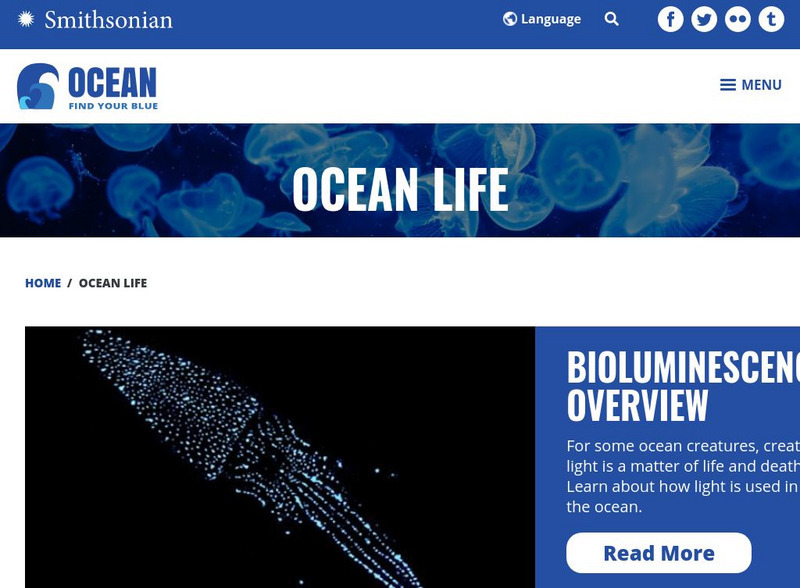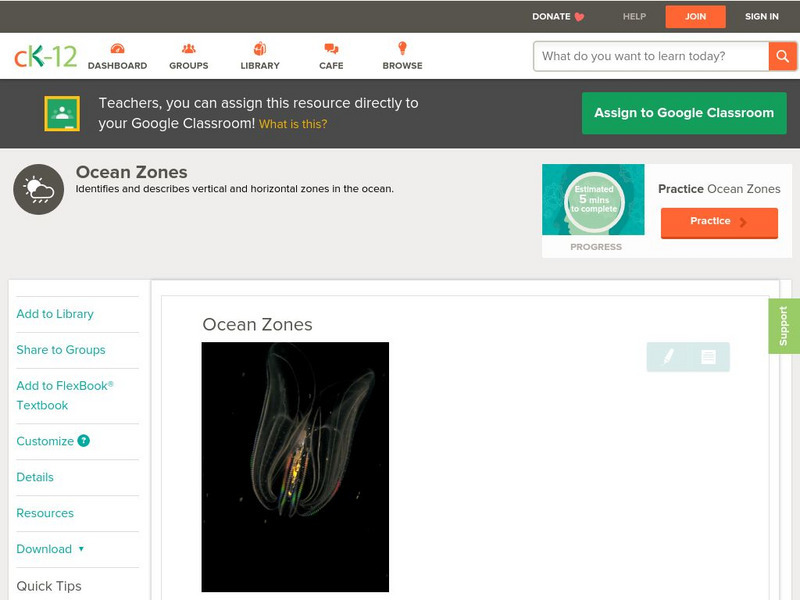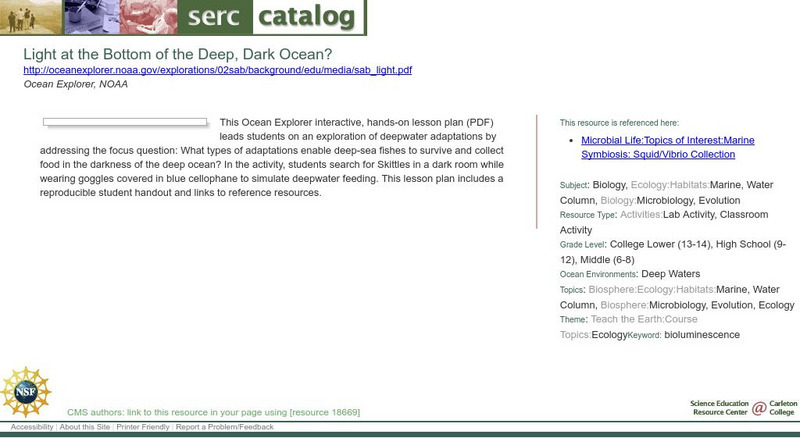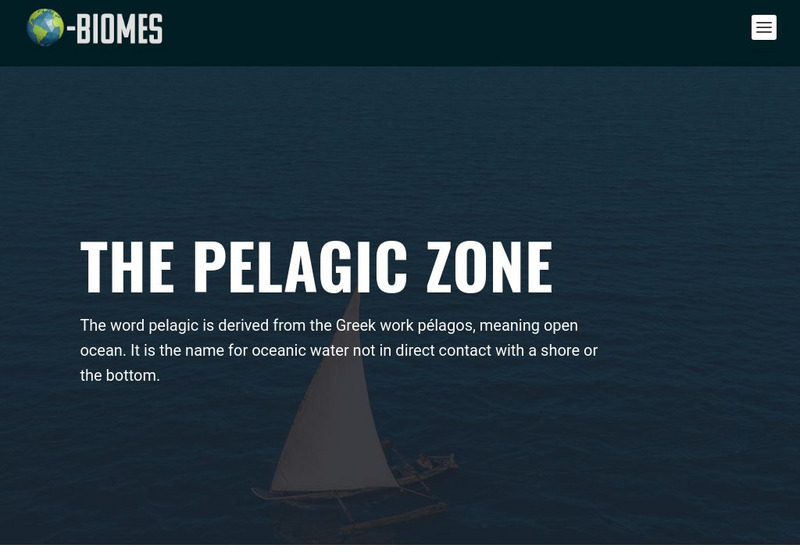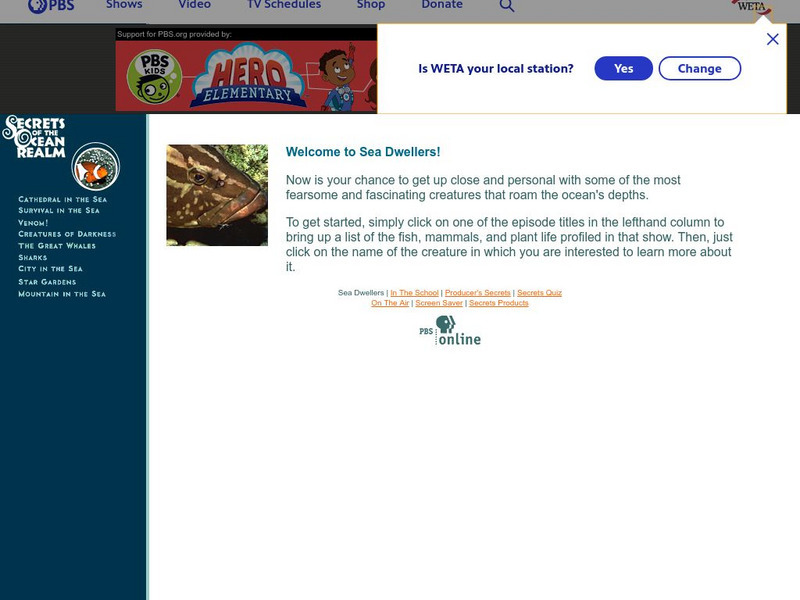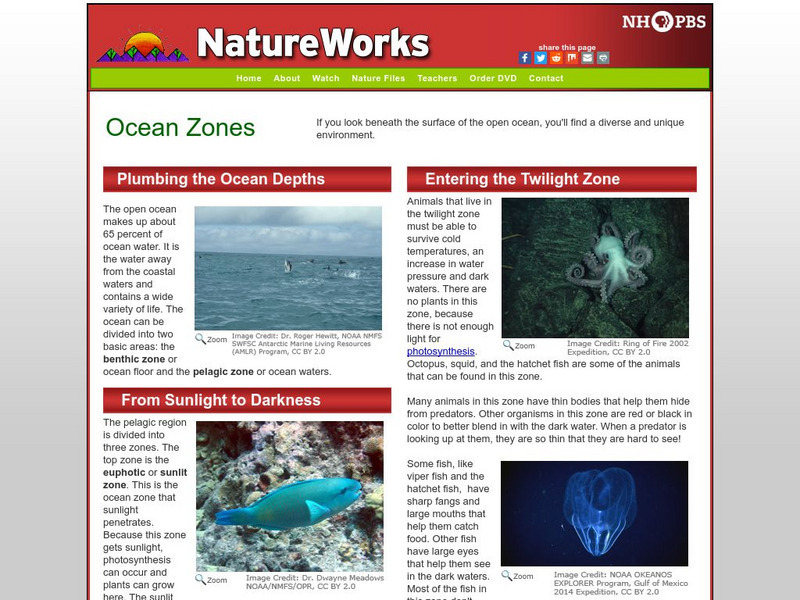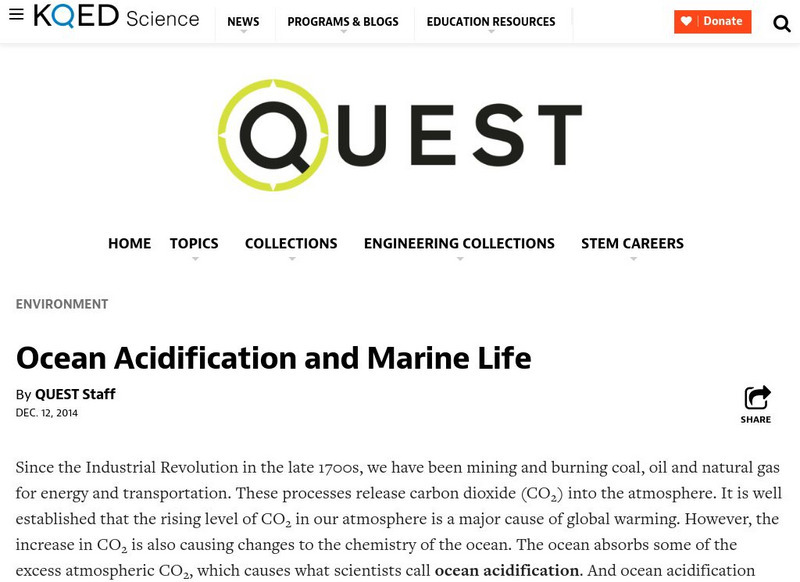Smithsonian Institution
National Museum of Natural History: Ocean Portal, You Navigate
Delight in the fresh colors, sights, and sounds on this dynamic site on the ocean. Major categories consist of Ocean Life & Ecosystems, The Ocean Over Time, Ocean Science, and The Ocean and You. New information on sharks, a slideshow...
Smithsonian Institution
National Museum of Natural History: Ocean Portal: Ocean Life & Ecosystems
From the tiny to the titanic, from the familiar to the undiscovered, the ocean offers a stunning diversity of marine life and nearly every kind of habitat imaginable. Dive in and explore them here. Links incude stories, videos and photos...
The Wild Classroom
The Wild Classroom: Biomes of the World: Coastal Ocean Biome
Learn about the coastal ecosystem. Find out about plants, animals, adaptations, and conservation efforts.
Smithsonian Institution
National Museum of Natural History: Ocean Planet
Detailed website that was a companion to a 1995 traveling exhibit of the Smithsonian. Links to lesson plans and other educational materials are at the bottom of the page. Enter the exhibition to explore the world of the ocean.
Boise State University
Boise State University: Ocean Exploration: Abyssopelagic (Abyssal) Zone
Learn about the very cold, dark region of the ocean known as the abyss. Includes information on the origin of the name of this ocean zone, as well as information on its depth and animal life.
The Franklin Institute
Treasures@sea: Exploring the Ocean Through Literature
This extensive resource consists of learning activities that integrate language arts with oceanography. Each activity is based on one of seven books about the ocean and are written to be adaptable. Includes writing activities, games and...
National Geographic
National Geographic: Ocean Abiotic Factors
After looking at examples of biotic and abiotic factors in ecosystems, students focus on abiotic factors in marine ecosystems, the physical processes that are involved, and the impact human activities can have on these. Includes handouts...
National Geographic
National Geographic: Ecosystem Imbalance in the World
In this activity, students build on their knowledge of individual impacts on the ocean to see how the whole system can react to threats and changes. They examine ways in which human actions throw marine ecosystems out of balance, explore...
NASA
Climate Kids: 10 Interesting Things About Ecosystems
Discover 10 interesting things about ecosystems, including features of coral reefs, rainforests, deserts, grasslands, freshwater ecosystems, the tundra, the ocean floor, wetlands, boreal forests and big cities.
CK-12 Foundation
Ck 12: Earth Science: Ocean Zones
[Free Registration/Login may be required to access all resource tools.] Describes the different zones of the ocean.
CK-12 Foundation
Ck 12: Earth Science: Ocean Zones
[Free Registration/Login may be required to access all resource tools.] Describes the different zones of the ocean.
National Geographic
National Geographic: Ocean Abiotic Factors
Students define and provide examples of abiotic and biotic factors of different ecosystems. Then they investigate the importance of abiotic factors and physical processes within ocean ecosystems.
Other
College of Exploration: Ocean Literacy [Pdf]
A guide to help educators become ocean literate. The goal is to redress the lack of ocean-related content in state and national science education standards, instructional materials, and assessments. PDF (requires Adobe Reader).
Science Education Resource Center at Carleton College
Serc: Light at the Bottom of the Deep, Dark Ocean?
What types of adaptations enable deep-sea fishes to survive and collect food in the darkness of the deep ocean? Interactive, hands-on lesson plan takes students on an exploration of deepwater adaptations by searching for Skittles in a...
The Wild Classroom
The Wild Classroom: Biomes of the World: Oceanic Pelagic Biome
Learn about the oceanic pelagic ecosystem. Find out about plants, animals, adaptations, and conservation efforts.
Science Education Resource Center at Carleton College
Serc: Lab 3: Oh What a Tangled Web: Ecosystem Based Management
A lab experiment in a series of experiments that looks at fisheries. In this particular lab, students use tools like Pacific Ocean Shelf Tracking to learn about the management of fisheries through an ecosystem-based approach. During this...
Encyclopedia of Earth
Encyclopedia of Earth: Ocean Oil: Coastal Ecosystems
A collection of articles, video, and some teaching guides on issues related to coastal ecosystems. Includes environmental issues, e.g., oil spills, and different types of ecosystems, e.g., mangroves and coastal grasslands.
NOAA
Noaa: National Ocean Service Education: Estuaries
Illustrated tutorial explains estuary ecosystems. Animations and illustrations help students become more familiar with the plant and animal communities which make up this coastal habitat.
NOAA
Noaa: Ocean Diversity Challenge [Pdf]
Read descriptions of organisms that live in the ocean. Locate the organisms on a poster based on their description.
PBS
Nh Pbs: Nature Works: Ocean Zones
Discover more about the underocean environment at this site that surveys animals, environmental factors such as light and temperature, currents, animals, plants, and the like.
Scholastic
Scholastic: Study Jams! Science: Ecosystems: Aquatic Ecosystems
A video and a short multiple-choice quiz on the topic of aquatic ecosystems. It discusses the difference between freshwater and saltwater ecosystems, then explains what the three ecozones are in a marine ecosystem.
PBS
Quest: How Ocean Acidification Affects Shelled Organisms
This step-by-step tutorial walks students through the effects of ocean acidification on some shelled marine organisms.
TED Talks
Ted: Ted Ed: Deep Ocean Mysteries and Wonders
Marine biologist, David Gallo, shows why oceans are important while taking the viewer on a voyage into the ocean and exploring the incredible beauty of marine life. [8:24]
Other popular searches
- Ocean Ecosystems Animals
- Arctic Ocean Ecosystems
- Ocean Ecosystems Activities
- Five Ocean Ecosystems
- Ocean Ecosystems Worksheets



